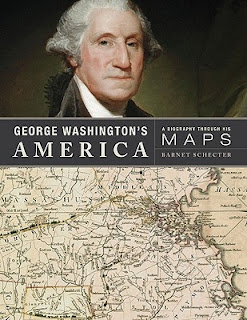This might clear the air a little, a new book exploring Washington's love of good maps.
Schecter's war coverage often suffers from such deadening compression. This isn't a high school history text. Schecter would have been better served by spotlighting just a dozen (or less) battles. But then there are all those beautiful, beautiful maps. It's easy to get lost in the otherworldly romance of the eighteenth century when gazing into these gorgeous color plates and insets.
Sounds like a visual feast!

Fascinating. Here's one I've had my eye on:
ReplyDeletehttp://yalepress.yale.edu/yupbooks/book.asp?isbn=9780300139013
Maybe we should read that new biography of Washington next. My eyes glazed over when I hit his comment in the preface about Washington's "muscular prose," but the opening section I read was very well written, and I'm open to a better understanding of George (although I'm pretty set in my view of him I'm afraid -- be fun to see if Chernow could change my mind).
ReplyDeleteThat is if I ever reach the end of Morris..... (I'm working on it!)
ReplyDeleteThe book on William Clark looks very interesting. Most accounts tend to focus very much on Merriweather Lewis, but Clark was the cartographer.
ReplyDeleteAnd this is how I came to know all of you. I was trying to figure out Clark's role in the expedition and low and behold.... there was a discussion of Lewis and Clark at the NY Times linked on the front page!
ReplyDeleteHard to believe but that was almost ten years ago (Sept. 2001)
Whoa! List price for the Washington maps is $67.50. Amazon has it 37% off at 42.53. Still a very pricey book.
ReplyDeleteMust be a coffee-table sized book.
ReplyDeleteI see William Clark hasn't been completely forgotten by historians. Found a couple of recent books written on his legacy,
ReplyDeletehttp://www.smithsonianmag.com/history-archaeology/William_Clark_and_the_Shaping_of_the_West.html
http://books.google.lt/books?id=P3RdxF38CDoC&printsec=frontcover&dq=Wilderness+Journey:+The+Life+of+William+Clark&source=bl&ots=Z01K1E3-Gm&sig=RUq5QwFVkNtIwxtS0fgvxsXw_bc&hl=lt&ei=XU4oTZb9NOqW4gaQuZH_CQ&sa=X&oi=book_result&ct=result&resnum=3&ved=0CC0Q6AEwAg#v=onepage&q&f=false